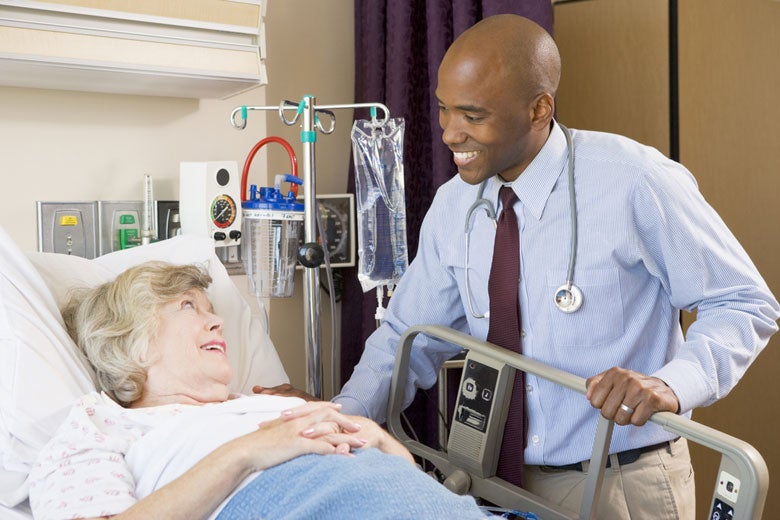
An emotional fit between patient and physician makes it more likely that the patient follows the doctor’s health advice, say Stanford psychologists.
A good bedside manner does count after all, new Stanford research shows.
A strong emotional fit between how a patient ideally seeks to feel and their doctor makes it more likely that the patient follows the doctor’s health advice, according to a study by Stanford psychology Associate Professor Jeanne Tsai and Tamara Sims, a postdoctoral fellow at Stanford and lead author of the study. Tsai directs the Culture and Emotion Lab at Stanford.
Tsai and Sims examined the patient-doctor relationship through two types of emotional states – “high arousal positive states,” such as excitement and passion, and “low arousal positive states,” such as calmness and relaxation.
In particular, they investigated whether a patient’s desired emotional state matched a doctor’s focus on high or low positive arousal.
An earlier study by Tsai and Sims revealed that how people wanted to feel (their “ideal affect”) predicted the physicians they chose. Most people ideally want to feel positive, but the specific types of positive states people want to feel differ, with some people wanting to feel more excited and others preferring serenity.
Participants who ideally wanted to feel relaxed and calm were more likely to choose similar physicians, while participants who ideally wanted to feel excitement or vitality were more likely to choose physicians showing these states of emotion.
“For instance, the more people wanted to feel excitement, the more likely they were to hypothetically choose a new physician who promoted excitement,” Tsai and Sims wrote.
The latest study goes beyond the choosing of doctors to show how an emotional fit actually influences a patient’s behavior outside the doctor’s office.
In an interview, Tsai said, “We found that how calm or excited participants actually felt didn’t matter as much as how calm or excited participants ideally wanted to feel when they were choosing their physicians and adhering to their physicians’ recommendations.”
Most research in psychology has focused on how people actually feel, but this research suggests that in some cases, knowing how people ideally want to feel is even more important in understanding people’s behavior, according to Tsai.
Sims said that by learning how patients want to feel and tailoring treatments accordingly, physicians can enhance their patients’ trust in them.
Finding out what matters to a patient in terms of goals and values is important, she noted.
“This may open the lines of communication so that not only do patients listen more, but they open up and disclose more information to their provider,” she said in an interview.
Competence, trust, knowledge
The researchers recruited 101 San Francisco Bay Area adults for a study involving a virtual health center. On the center’s website, participants answered questions about their health and ideal ways of feeling good, and then watched a video featuring their assigned physician. In those videos, the doctors emphasized either high arousal or low arousal positive states in how they communicated.
Afterward, the test subjects received feedback from their physician and the same list of six health recommendations (such as taking a walk after eating a meal and doing muscle-strengthening activities).
For the next five days, the participants reported on whether they actually engaged in the behaviors recommended by their virtual physician, as well as their own actual and ideal daily feelings and emotions. At the end of that period, the subjects evaluated their doctor on competence, trust and knowledge.
The research showed that the more participants wanted to feel low arousal positive states, the more positively they evaluated low arousal positive focused physicians.
Also, the more participants wanted to feel high arousal positive states, the more positively they evaluated high arousal positive focused physicians.
Finally, participants who ideally wanted to feel relaxed and calm were more likely to follow the recommendations of physicians exhibiting calmness, and participants who ideally wanted to feel more excited were more apt to follow the advice of physicians who seemed more energetic.
Health, ethnic implications
Room for improvement exists in the patient-doctor relationship, Tsai and Sims wrote. Physicians, they noted, should recognize that their patients have “affective ideals” that might influence how they respond to physicians.
Other suggestions include:
- Physicians could evaluate their patients’ ideal affect in light of whether there are more effective health care providers or treatments consistent with those ideals.
- If none exist, physicians might discuss with patients how their ideal affect might help or hinder specific health care recommendations and treatments.
- More effective interventions aimed at educating clinicians about the importance of ideal affect in health care should be developed.
Emotions matter in the health care world, Sims said.
She added that the primary motivation behind the research was to understand the reasons for ethnic disparities in health care.
“Because we know culture shapes the emotions people want to feel, the way in which health care information is communicated may not be equally effective across diverse groups of people,” Sims said.
For example, she said, when a doctor tells people to exercise or eat right in order to feel more energized, it may not actually appeal to people from cultures who seek to feel calm.
Tsai added, “To some degree, physicians – like the rest of us – know that people differ in certain types of values – for example, how much people value making money – but they typically don’t know that people also differ in their emotional values. Feelings seem so automatic and natural that it’s hard to believe that someone might want to feel a different way than we do.”
Media Contacts
Jeanne Tsai, Psychology: (650) 736-1843, jeanne.tsai@stanford.edu
Tamara Sims, Psychology: tamarasims@stanford.edu
Clifton B. Parker, Stanford News Service: (650) 725-0224, cbparker@stanford.edu